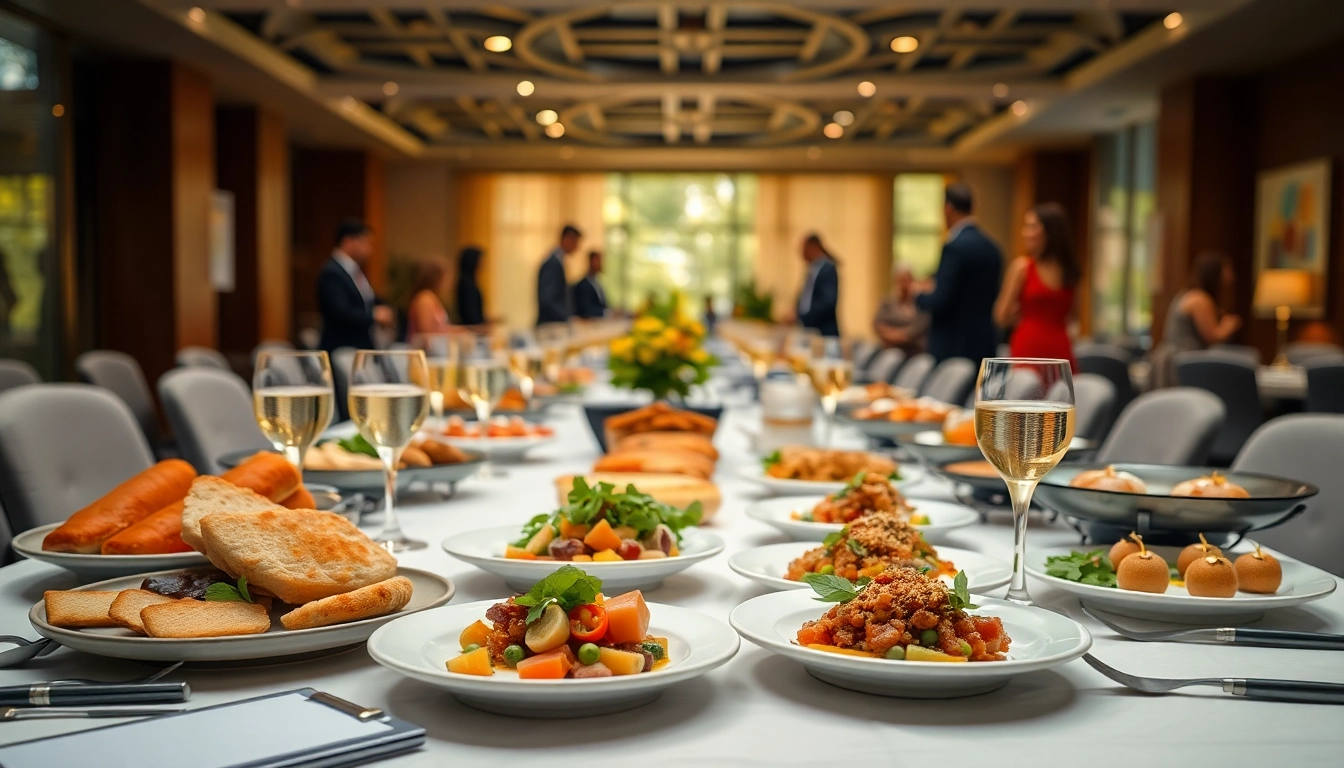Understanding the Importance of Catering for Conferences
Catering plays a pivotal role in shaping the overall experience of conference attendees. It is more than just providing food; it is about creating an environment that fosters engagement, networking, and satisfaction. In Hamilton, Ontario, where numerous conferences are held throughout the year, having effective Hamilton Ontario catering for conferences can significantly enhance the event’s success.
What Makes Catering Critical?
The success of a conference often hinges on several elements, among which catering is paramount. Quality food and beverage service can create an atmosphere that encourages discussion and collaboration among attendees. Catering can also reflect the values and attention to detail of the organization hosting the event. When attendees enjoy their meals, they associate this positive experience with the overall event, increasing their likelihood of returning in the future.
Types of Conference Catering Services
Catering services for conferences can vary widely, catering to different themes, dietary needs, and attendee preferences. Here are some common types of catering services:
- Buffet Style: This traditional format allows guests to serve themselves, encouraging mingling and providing a variety of choices.
- Plated Service: A more formal setting where meals are pre-plated and served, offering a polished dining experience.
- Food Stations: Interactive stations where guests can choose from various food options, fostering engagement and personalization.
- Finger Foods and Appetizers: Ideal for networking events, featuring easy-to-eat small bites that allow for easy conversation.
Measuring the Impact of Good Catering
The impact of catering extends beyond taste; it influences attendee satisfaction, engagement levels, and networking opportunities. Surveys and feedback forms can be used to gauge attendee satisfaction with the catering aspect of the event. Metrics such as meal consumption rates, positive mentions in social media posts, and overall attendee retention can assist in measuring the impact of catering on the conference.
Choosing the Right Catering Service
Selecting the right catering service is crucial for the success of your conference. The right choice can elevate the experience of participants and contribute to the overall objective of the gathering.
Factors to Consider When Selecting Caterers
When choosing a catering service, several factors should be taken into account. These include:
- Experience: Look for caterers with a strong track record in managing conferences and large events.
- Menu Options: Ensure they can accommodate the diverse tastes and dietary restrictions of your attendees.
- Food Quality: Prioritize caterers known for high-quality ingredients and presentation.
- Budget: Choose a caterer that can work within your financial parameters without compromising quality.
Reading Reviews and Testimonials
Before selecting a caterer, reading reviews and testimonials can provide valuable insights into their reliability and service quality. Check online platforms, catering websites, and social media for authentic reviews from previous clients.
How to Compare Different Catering Offers
When analyzing various catering offers, it is essential to compare not only costs but also menu options and service quality. Request proposals from multiple caterers and examine how each addresses your specific requirements, including service staff availability and experience, setup, and clean-up services. Create a pros and cons list to make the decision-making process easier.
Menu Planning for Your Conference
Effective menu planning is essential to ensure that the catering aligns with the goals of the conference while catering to the needs of the attendees.
Creating a Balanced Menu
A well-balanced menu includes options that cater to various dietary requirements—this can include vegetarian, vegan, gluten-free, and meat options. It is crucial to provide a mix of flavors, textures, and colors to enhance visual appeal and engagement.
Accommodating Dietary Restrictions
With increased awareness surrounding dietary restrictions, it is essential to ask attendees about their dietary needs beforehand. Providing a range of options ensures that every participant feels included and has suitable choices, enhancing the overall experience.
Seasonal Ingredients and Their Benefits
Utilizing seasonal ingredients not only enhances flavors but also supports local producers and reduces environmental impact. Creating menus based on what’s in season can also provide unique dishes that elevate the dining experience.
Enhancing Attendee Experience with Catering
The catering experience can significantly enhance overall attendee satisfaction, making it crucial to focus on creativity in presentation and interaction.
Engaging Presentation Styles
The way food is presented can be just as important as the food itself. Creative presentation styles, such as elegant plating or vibrant food stations, can make meals memorable. Engaging displays draw in attendees and encourage them to explore the meal options available.
Interactive Food Stations and Their Appeal
Interactive food stations allow attendees to customize their meals, fostering engagement and personalization. Options like build-your-own taco or pasta bars can create a fun atmosphere while allowing attendees to craft their unique culinary experiences.
Networking Opportunities through Catering
Food and networking go hand in hand. Coffee breaks, cocktail receptions, and meal breaks provide ideal opportunities for attendees to connect. An effective catering plan can create spaces that encourage informal conversations and relationship building among guests.
Evaluating Catering Success Post-Conference
After the conference concludes, evaluating the success of the catering allows for continuous improvement and planning for future events.
Gathering Feedback from Attendees
Feedback surveys should include specific questions about the catering service, including food quality, variety, and service. Understanding attendee perceptions helps identify strengths and areas for improvement.
Analyzing Metrics for Future Improvements
Metrics such as meal consumption rates, satisfaction scores, and social media mentions can provide concrete data to support feedback. Use this information to refine future catering selections and improve the overall attendee experience.
Building Relationships with Caterers for Long-Term Partnerships
Establishing strong relationships with dependable catering partners can benefit future events. Maintaining open communication and sharing feedback ensures that caterers understand your needs and can continually adapt to provide exceptional service.
